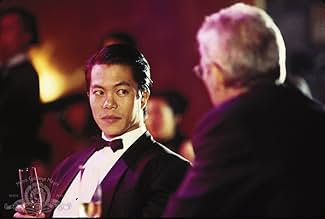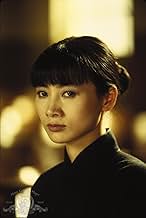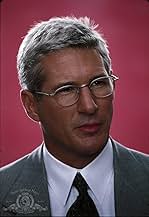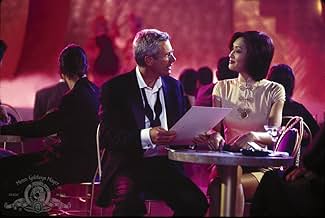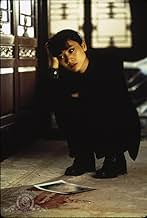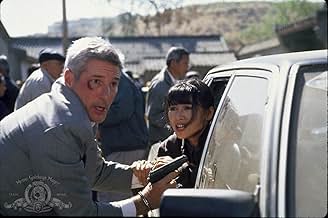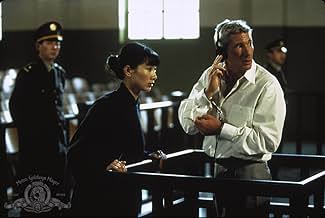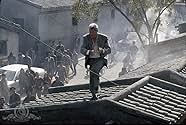Un abogado estadounidense que trabaja en China es arrestado injustamente y enjuiciado por asesinato, y una abogada defensora del país es la única clave para demostrar su inocencia.Un abogado estadounidense que trabaja en China es arrestado injustamente y enjuiciado por asesinato, y una abogada defensora del país es la única clave para demostrar su inocencia.Un abogado estadounidense que trabaja en China es arrestado injustamente y enjuiciado por asesinato, y una abogada defensora del país es la única clave para demostrar su inocencia.
- Dirección
- Guionista
- Elenco
- Premios
- 4 premios ganados en total
- Dirección
- Guionista
- Todo el elenco y el equipo
- Producción, taquilla y más en IMDbPro
Opiniones destacadas
But of course hindsight's always easy, and since most people who reviewed Red Corner eight years ago never lived in mainland China, it was likewise not highly probable they would see it through the same jaded, seasoned eyes. And in fact, it helps to be experienced in China living when watching Red Corner, for much of its deeper mannerisms only become apparent if you know how and when to look for them.
For example, Richard Gere (as subtle and low-key as usual) portrays Jack Moore, a US-based business person willing to forego ideals and politics in order to enter the much vaunted mainland market, hyped up to be the best thing since instant noodles, when in fact like everything in life, it too comes at a price. When time arrives to sign a large media contract, Moore wants to pause and assess particulars by the book. He also notices China's newly-found penchant for blunt nationalism (oops, "patriotism", done nicely by a scene where he gauges club-goers' vehement reactions to a coaxing DJ), and doesn't quite feel good about his local contacts (including excellent veteran James Hong).
But as a simple mortal, Moore joins a gorgeous catwalking model (Jessey Meng) at his hotel room for a night of brief pleasures. Brief, because the next morning begins with him dragged away by Beijing cops who, having found the girl's dead body in the room and her fresh blood all over him, proceed to assume the American guilty.
Now, Red Corner's not a racist film. It doesn't fall into obvious stereotypes, nor does it contain any racial slurs (or profanity at all). Asians aren't made to be villains, just as the uncaring US embassy staff do not in any way represent the Western contingent. Having said that, the movie doesn't shy away from painful issues. It clearly conveys xenophobic attitudes found among mainland people and authorities, as many who've lived there can attest to. Of course, not everyone's like that, and competent actress Bai Ling (The Crow, Anna and the King) does well as Moore's honest, crusading defense attorney, Shen Yuelin, during what quickly devolves into a kangaroo court.
Meanwhile, Red Corner shows the abusive treatment our protagonist's subjected to, often to the point of endangering his life. When asked, Shen Yuelin's assistant says that Moore's frequent beatings are simply "because he's a foreigner", a familiar sentiment to non-Chinese residents of the mainland.
Similarly, the Americans involved in this legal fiasco wish to distance themselves from aiding Moore, as doing so might work against commercial interests based on sheer greed. Thus Red Corner preceded its time by faithfully showing how global factions are willing to play along just to get that great juicy carrot dangling from a stick most don't want to acknowledge. As of 2005, companies like Microsoft and HP openly pursue a policy of appeasement when it comes to China, willingly accepting political strings attached to what are supposed to be mere commercial activities.
And if you don't consider all that a sign of the film's credibility, how about the fact that mainland authorities quickly moved to ban it and prevent its cast and crew from entering China? Just for its attempt to challenge an authoritarian mindset and stand for free expression alone should Red Corner be applauded.
Additionally, it's a mostly believable project from start to finish, accurately sampling many of China's social staples through concepts such as "guanxi" (connections) and "da ge" (basically a nickname for somebody more respected than oneself), yet doesn't make any claims of exotica, while steering clear of clichés (save for Yuelin living with her kindly old grandmother). There's one scene showing Yuelin speaking to a police official in English so as to avoid making him "lose face", which is utter nonsense of course (probably the actor doesn't speak Chinese).
Moore himself speaks just a bit Putonghua (standard Chinese), as do many of the business people and newly-arrived in mainland China. Again, familiar from real life, as was the interaction between him and the locals. Beyond that, for something made almost entirely in California, Red Corner passes for Beijing with very few glitches (vehicles sometimes don't look authentic), featuring ample attention to detail and an atmosphere faithful to the original. Certainly, some footage was covertly shot in Beijing itself, yet due to the government's disapproving attitude, production had to relocate back to the States. All in all, Red Corner also plays it fair, going to show that China does have judicial systems with a potential to work as well as any others. It makes a point of addressing the mainland's criminal code, and court hearing procedures all appear in detail. Plus, eventually the truth does come out, and while it's pretty obvious who dunnit from the get go, this isn't the main point here.
The point is a warning against oppression wherever it may be and whatever form it may take, and a cautionary note regarding the perils of blind opportunism. Just because somebody promises you a gilded prize for playing by their rules doesn't mean those rules stop applying once the prize is obtained, if at all. And if we're not careful, there won't be too many reviews of this critical nature in times to come. Relations with China, as with any other nation, should be equivocal and based on standing for your own values, not another's, and that means not compromising liberties and freedoms standing at the very core of enlightened, progressive society. Like Red Corner's tagline says, leniency for those who confess and comply, severity for those who dare resist, that will be our downfall.
Rating: * * * *
Gere, a follower, I believe, of the Dalai Lama whom the Communists forced out of Tibet, uses this film to get his shots in at his mentor's enemy. Anyone who thinks this is just a coincidence is pretty naive. Nonetheless, the facts support the film's stark, brutal portrayal of Communist China's leadership. At the very least, it shows a regime unwilling to hear both sides of a story. (Hollywood has often given the same treatment to the U.S. government, showing it more often in a corrupt light, which is ludicrous compared to restrictive Communist China.)
Anyway, Gere really dominates this film, being in almost every scene. This is your basic frame-up-then-prove-your-innocence-in-court story. It keeps your attention throughout although I thought the ending was a bit confusing because things happened almost too fast for the viewer to take in. At two hours, the film could have been trimmed a tad but the lulls in here were not much.
Overall, an underrated film and unjustly criticized by the national critics, most of whom don't like it when communism is bashed.
Reading the production notes and trivia on here is interesting to me because it shows how the producers really did capture the reality of what goes on in Red China. I visited all over China and Lhasa, Tibet, right after the olympics and can vouch that the same legal situation still exists there today. In Beijing, we drove by a large, concrete and windowless court-building with the CCP emblem (seen many times in the film, and omnipresent in China in general) and when asked what the building was, my tour guide just responded plainly, "That's where you go to die."
For a foreigner, yeah, it might take a murder or espionage charge to keep you imprisoned indefinitely over there, but for Chinese citizens, many crimes are still punishable by execution without a fair trial, just as the film accurately portrays.
So, if you're into Chinese history or culture, then this is definitely worth watching, even more than once. If not, then don't watch it.
¿Sabías que…?
- TriviaIn order to heighten the film's sense of reality, director Jon Avnet, actress Bai Ling, and co-producer Martin Huberty traveled to Beijing for a week of "guerilla" shooting, without the knowledge or permission of the Chinese government, to capture the first-ever 35mm film of the city to appear in a Hollywood film.
- ErroresThe closing scene of a Chinese airport reveals an American West 737. American West does not fly to China.
- Citas
Shen Yuelin: If you plead not guilty, you will be sentenced to death. And, unlike in your country, Mr. Moore, sentences are carried out within a week. You will be shot, and the cost of the bullet will be billed to your family.
- Créditos curiososThe opening title is first displayed in Chinese "letters" (called hanzi) which then change into English.
- Bandas sonorasY.M.C.A
Written by Henri Belolo, Jacques Morali and Victor Willis
Performed by The Village People
Courtesy of Scorpio Music and Courtesy of Mercury Records, Inc.
By Arrangement with PolyGram Film & TV Licensing
Selecciones populares
- How long is Red Corner?Con tecnología de Alexa
Detalles
- Fecha de lanzamiento
- País de origen
- Sitio oficial
- Idiomas
- También se conoce como
- Red Corner
- Locaciones de filmación
- Pekín, China(Establishing shots, including the opening scenes were shot in Beijing, including a bicycle ride through Tiananmen Square.)
- Productoras
- Ver más créditos de la compañía en IMDbPro
Taquilla
- Presupuesto
- USD 48,000,000 (estimado)
- Total en EE. UU. y Canadá
- USD 22,459,274
- Fin de semana de estreno en EE. UU. y Canadá
- USD 7,403,362
- 2 nov 1997
- Total a nivel mundial
- USD 22,459,274
- Tiempo de ejecución2 horas 2 minutos
- Color
- Mezcla de sonido
- Relación de aspecto
- 1.85 : 1
Contribuir a esta página



